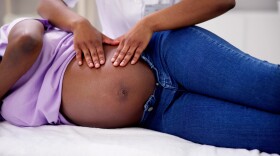People who study empathy say that before you can empathize with the plight of others, it’s important to see their humanity and what it has in common with your own. One of the problems with homelessness is that we don’t always do that - we distance ourselves from the stories of homeless people.
For Lake Effect essayist Jan Wilberg, something profound and life-changing forever changed her view:
It was an oddly cool July morning when we went to the crash scene. On the ground sprayed out from the dented utility pole were parts of our son’s car left behind by the city’s tow truck. Wet envelopes and papers were stuck to the pavement, a letter from his daughter’s school, unopened bills. Teetering to the side was the front fender, its edges charred black. It never occurred to us, his father and me, that his car had caught fire.
Our son had been badly injured in the crash, his pelvis shattered into twelve pieces, but he had not been burned. Yet firefighters had been there. Everything was soaked. We wondered about this out loud just as a stranger walked up the hill toward us.
“Do you want to know what happened? I saw it all,” he shouted.
I’d seen this young man earlier, holding a sign asking for cash as drivers stopped at the light. I’d probably seen him before because we often stopped at that intersection before getting on the freeway. Sometimes we argued about giving money to the guys holding the signs but usually we looked straight ahead and waited for the light to change.
He was wearing a black t-shirt and a necklace with a large silver cross. He wore a baseball cap turned backwards over his long dark hair. He had a mustache and thin beard. He seemed friendly and we walked toward him, saying, “Yes! What happened?”
“Me and my friends saw everything.” He told us that he and four friends heard the crash and then watched the car burst into flames. They saw the driver inside and ran to rescue him. It was a struggle, he said, but they finally pulled him away from the car and laid him on the pavement. A few minutes later, fire trucks arrived.
The man’s name was Billy. He was still holding his sign in one hand when I hugged him. “You saved our son’s life!” “The five of us did,” he said, smiling. I asked him where he stayed and he pointed over his shoulder, “Under the bridge.” We told all this to our son while he lay in traction waiting for surgery and he looked at us not remembering but five months later at Thanksgiving dinner, it was Billy he said he was grateful for.
Soon it was deep winter. Milwaukee was so cold that emergency warming rooms opened up for homeless people to stay overnight. I volunteered at the largest warming room for the early morning, wake-up shift. I helped set out breakfast cereals and fruit, made thick peanut butter and jelly sandwiches, cut them in half and packed them in little bags to put in coat pockets as people left to weather the daylight cold.
In the dark church gymnasium, sixty people laid spread out on sleeping bags and blankets. My job was to help them wake up. I walked around the room, whispering softly, “Good morning, it’s time to get up.” Some stirred, but others needed many calls and finally we turned the lights on in order to have everyone out the door on time. Billy wasn’t one of our guests. We were told he had an apartment now and was off the streets. But it was Billy I saw in every face, the same Billy I hugged that morning in July.
Jan Wilberg is a writer and community activity who lives on Milwaukee’s East Side.





